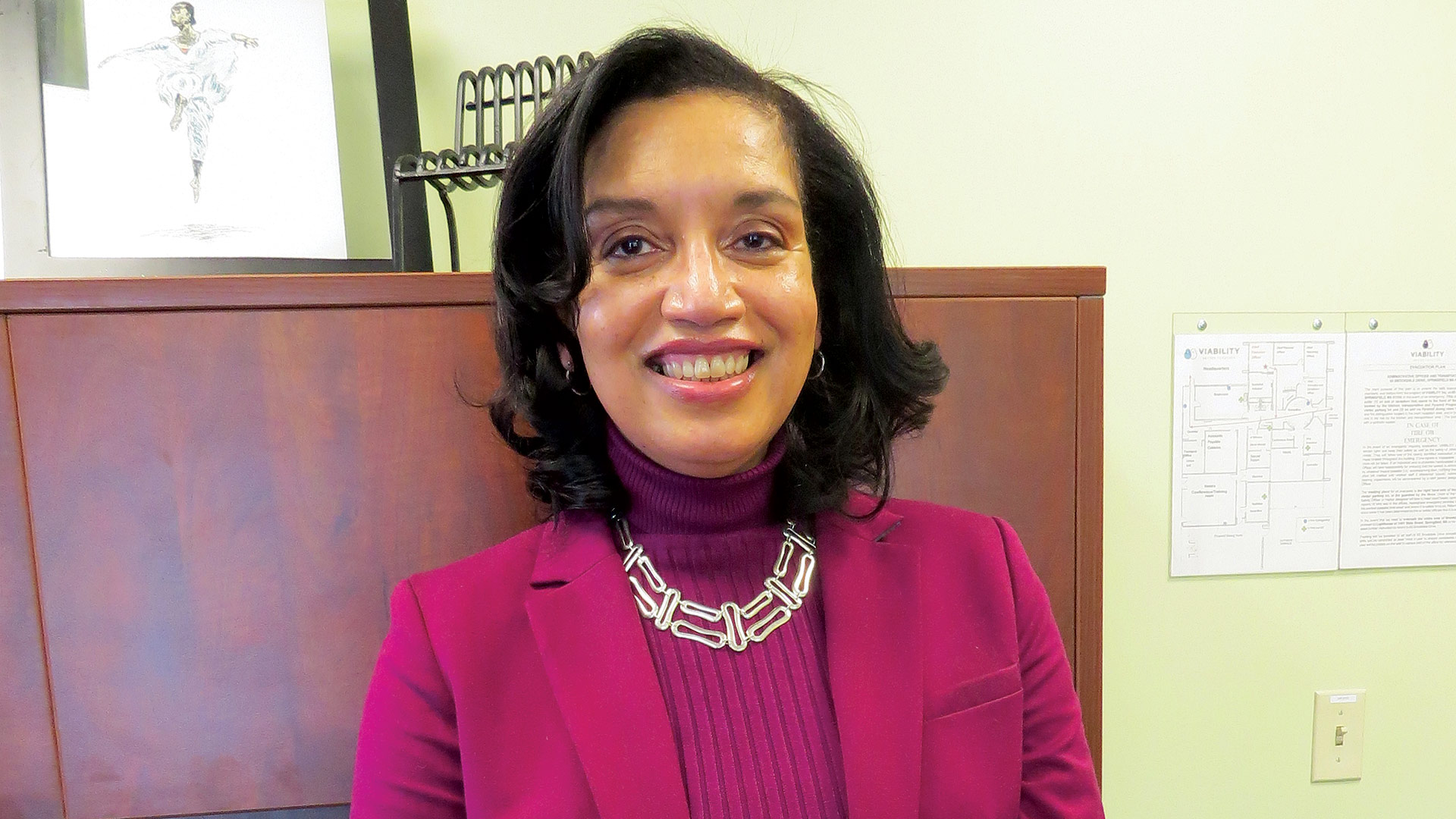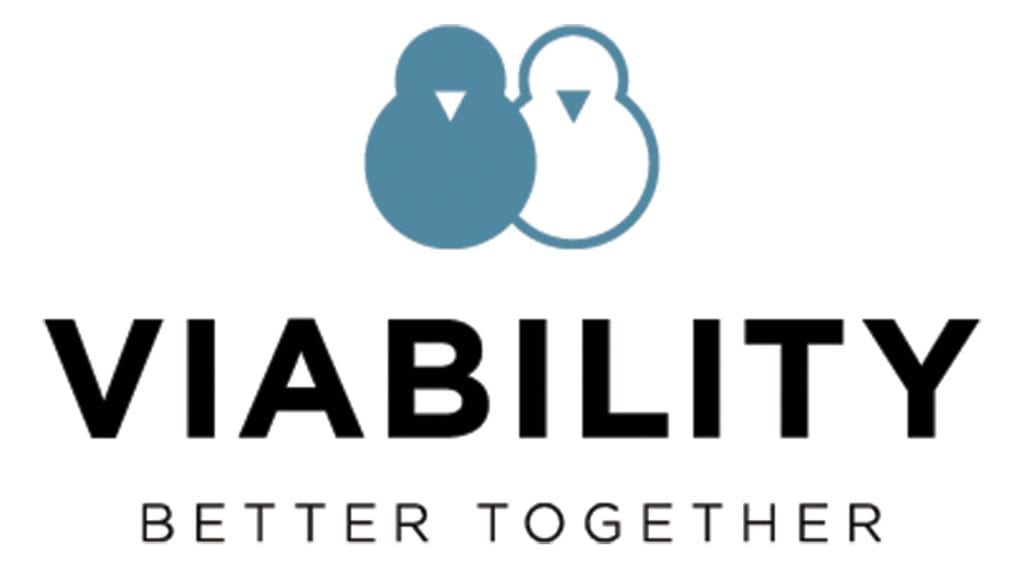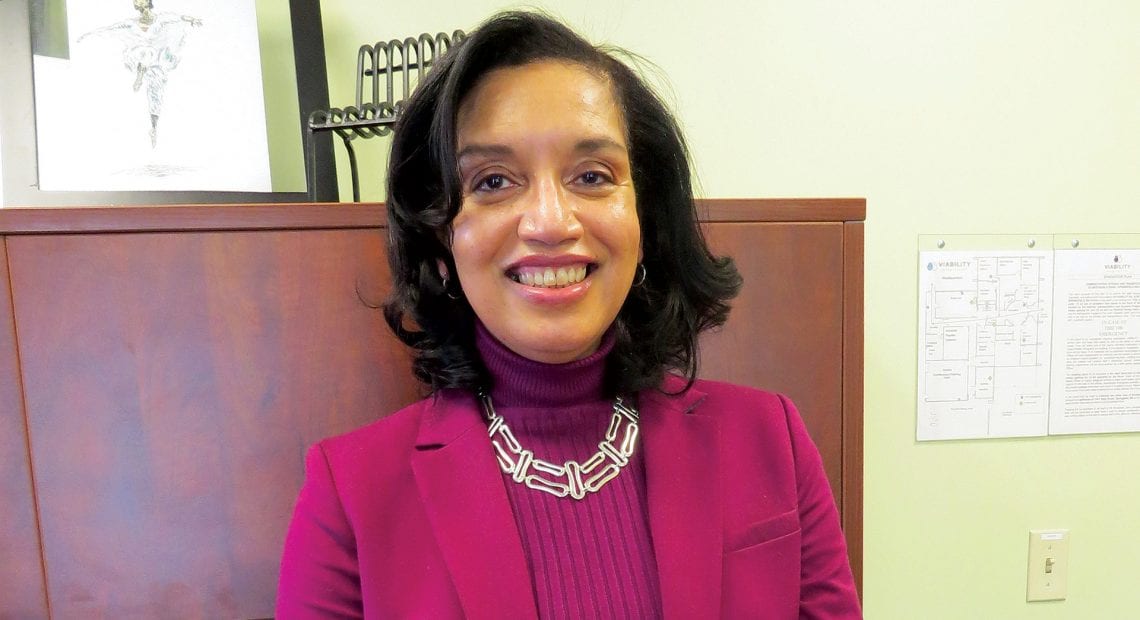Putting Experience to Work

Colleen Holmes says client employment, inclusion, and empowerment have been challenged by the pandemic.
Colleen Holmes calls it a ‘full-circle moment.’
That’s how she chose to describe her decision to assume the role of president and CEO of Viability, the Springfield-based nonprofit with a broad mission that boils to providing services — and creating opportunities — for those with disabilities. Those opportunities come in a number of forms, and we’ll get to that shortly.
But first, that ‘full circle’ reference. Holmes used it to note that she spent a full decade at one of the legacy agencies, in this case Human Resources Unlimited (HRU), that became Viability in 2107 (Community Enterprises was the other) before moving on to a new role leading as president and CEO of the 18 Degrees agency.
So she’s back where she was. Well, sort of, but not really. Viability is a much bigger agency than HRU was — it boasts $36 million in annual revenues, 420 employees, and 37 sites in four states — and so much has changed in the interim, much it before COVID-19. And the pandemic has simply added another layer — or several layers, when you get right down to it — of challenge and intrigue.
“Coronavirus has in no way taken away from the need for the services we provide. And in many ways, it has made it even more important to provide those services; that has been job one for me, and for all of us here.”
“Coronavirus has in no way taken away from the need for the services we provide,” Holmes explained. “And in many ways, it has made it even more important to provide those services; that has been job one for me, and for all of us here.”
In that respect, much hasn’t changed, and she has, indeed, come full circle, especially when it comes to agency’s mission, which boils down to enriching the lives of the people served by the agency and continuously reinforcing the belief that every individual, no matter their ability, can be a valuable contributor to the community — and the workforce.
It carries out this mission through a number of programs and services, including:
• Clubhouses, which provide members with a supportive environment to increase their vocational, educational, and social skills;
• Partnering with more than 600 employers to provide members with a variety of supported employment opportunities;
• Community living programs that provide that provide care management, direct care, and referral services to individuals with disabilities, enabling them to live in the community with dignity;
• Day supports and various recreational programs that provide individuals with a broad range of community activities; and
• Transitional services that provide members with upfront job-readiness skills, placement assistance, and ongoing supports.
The common denominator in each of these areas, said Holmes, is dedicated staff that not only make the programs happen, but make the individual goal set by and for each member attainable.
“This work doesn’t happen without our staff — and I don’t mean that simply from the standpoint of hands being on deck,” she said. “A lot of the way in which progress is made with individuals is through trusted relationships that are built that give people a safe space to try things, to grow, to progress, to fail and come back and try again another day. Those trusted relationships are pivotal, and our staff’s ability to offer that is everything.”
But COVID has certainly impacted many of these initiatives, said Holmes, adding that the agency has collectively overcome a number of challenges to keep employment, inclusion, access, and empowerment for people with disabilities in the forefront, despite the pandemic. Moving forward, lessons learned from the pandemic will be applied to the future of these programs and services and how they are provided.
“What worries me is that some of these people are losing ground that they worked so hard to gain — people who were working, people who were gaining life skills, people who were gaining in their levels of independence, people who were ready for their next step in employment. There are a number of folks who have lost ground.”
And there will be some important ground to be made up, she said, adding that, in some cases, COVID stunted the progress being made by some members who were forced inside and into a form of isolation that is not part of this agency’s MO.

“What worries me is that some of these people are losing ground that they worked so hard to gain — people who were working, people who were gaining life skills, people who were gaining in their levels of independence, people who were ready for their next step in employment,” she noted. “There are a number of folks who have lost ground.”
Overall, however, many members, and the agency as a whole, have been able to carry on and move forward through this pandemic, she went on, adding that many members work in essential positions, and they take pride in being essential.
For this issue and its focus on employment, BusinessWest talked at length with Holmes about her new assignment, but especially about how the pandemic has only magnified the need for the various services this agency provides, and how Viability has gone about responding to this changed landscape.
Work in Progress
Holmes said she certainly wasn’t looking for a new challenge when Don Kozera, the long-time CEO of HRU, her former boss (she served the agency as special projects coordinator), and, most recently, the interim president and CEO of Viability following the unexpected passing of Dick Venn (who stepped into that role after having the same titles at Community Enterprises), asked to talk with her about possibly becoming a candidate for this role.
Suffice it to say he did a good sales job, although it wasn’t necessarily a quick or easy sell.
“He said he thought I would be a good fit for this position and asked if I might consider it,” Holmes recalled. “And I said, ‘I don’t know … I’ll go talk to people; I’m always happy to do that.’”
She did talk to people, and came away intrigued by the possibilities.
“What I saw in this was an opportunity to sort of test my skills and challenge myself in a larger organization; this one is probably two and half times the size of the organization I was leading,” she explained. “Also, and this is probably most compelling, coming to Viability was an opportunity to advance work that matters to me in a different and larger arena.
“Our focus is on employment, training, empowerment, and inclusion with people who have disabilities and other challenges and disadvantages,” she went on, “and that speaks very much to me, in the combination of capacity building and social-justice change.”
Fast-forwarding a little, she did enter what became a nationwide search for a permanent president and CEO, and prevailed through a series of interviews conducted virtually, which she described as a new and different experience — at least as the interviewee.
She arrived in November to a full plate of challenges, including continuation of the daunting process of combining HRU and Community Enterprises into the larger entity that exists today, work that was in some ways slowed, and complicated, by both the passing of Venn and then the arrival of COVID.
“As I came on board, the organization that I am coming to know was ready to be on the other side of that transition,” she told BusinessWest. “And it would have been on the other side sooner had it not been interrupted by the grief and loss of Dick Venn, and had it not been for a pandemic.”
Elaborating, she said that what has been delayed has been the process of “breaking down the silos” within the organization. “You have a much larger organization in every way you can name — there’s more staff, many more programs and services, and in more geographic areas — and one that was continuing to grow, not just as a result of the merger but because it’s part of the mission, vision, and value of the organization. It’s about silos, systems work, and some of the basic functional things, like IT.”
A big part of the process of leading the organization to that proverbial ‘other side’ is to do a lot of “listening, watching, and learning,” she noted.
“You don’t walk into an organization like this one and think you know what you need to know,” she explained. “And I can say I’ve walked into an organization of people who are very welcoming, very helpful, who have lots to share, and who are deeply committed to the mission. Our people show up because they believe in the work that they’re doing and the people they’re working with.”
The Job at Hand
Supporting and nurturing this staff is just one of the many priorities for Holmes moving forward — and is, in itself, a challenge.
“One of my larger concerns, and it’s one that’s certainly shared, is the fact that human-service salaries are woefully inadequate to the jobs people do,” she explained. “Joining in advocacy efforts at the state level for eliminating the disparity in pay between community-based providers and state employees who do substantially the same work is important. But it’s also important for us as an organization to prioritize our staff to the extent that the limitations of our largely state-funded dollars allow us to do. Continuing services and supporting our staff are real priorities.”
Another priority, of course, will be transitioning, if that’s the right word, to a post-COVID world. Many staff members have been working remotely, she noted, and there are questions moving forward about how and where work will be carried out and even how much office space the agency may actually need in the short and long term.
And there are many factors to consider in making those decisions, she said.
“It comes down to how we most effectively support the services and the staff members that are delivering the services,” she explained. “There might be a natural tendency to say, ‘OK, there are certain positions that can be carried out remotely, so let’s just put all of them out and save that space.’ But it’s more complicated than that; human-services work is very collaborative. It’s teamwork, but more deeply than that, there is an environment of support that’s hard to come by when you’re not in contact with people, when people don’t see you walk through the hall and see you being a little more tired, a little more stressed than normal. In the kind of work we do, we need to pay attention to that.”
Meanwhile, there are those lessons learned and the new ways of doing things that came about out of necessity — and ingenuity.
“There was a brief period when staff needed to switch to providing services remotely, and … by golly, they did it,” Holmes told BusinessWest. “You get creative, and I’m sure we all have; you learn how to do some things differently, and you discover that the paradigm of how services are provided is turned on its head.
“That’s a new skill set we’ll carry forward, but it by no means replaces in-person services,” she went on, adding that, moving forward, the agency will look toward using the new skills and new technology, including virtual reality, to carry out its mission.
She noted that Viability is using virtual reality to acclimate and train clients and members for job placements. “We started during the pandemic, and we’re very much in the testing and piloting stage,” she explained, adding that early results are very positive. “If you have folks who have autism or others who for various reasons are highly sensitive to changes in environment or to noises, or just to new experiences … to be able to take a work environment and load it into a virtual-reality system so that people can safely explore and navigate that workspace without actually being there is very advantageous. It can lead to much smoother transitions.”
As for the employment programs, the ones that put thousands of individuals in jobs across this region and beyond, COVID prompted some businesses to close and many others to slow down, said Holmes, adding that obvious question marks remain about when and to what extent business, and jobs, will pick up again.
“It is a concern as to how long the economic rebound takes, and if there continues to be a shortage of positions,” she said. “As is so often the case, people who are marginalized are pushed out first, so that is a concern. But there are a number of employers we partner with who, through experience, will tell you the value of working with us, and that, when it comes to our members, their attendance is superior, and the quality of their work is at least on par.”
Past Is Prologue
Holmes has talked with many such employers over the years, so she understands those sentiments. She has, as she said at the top, come full circle when it comes to her career in human services.
But in most all respects, she is not coming back to where she was years ago. The landscape has changed in myriad ways and, thanks to COVID, it continues to change, each month and almost each week.
This is a different test, a sterner test, one she fully embraces. As she said, she’s excited about the opportunities — for herself, but especially for those benefiting from Viability’s programs and services.
George O’Brien can be reached at [email protected]






